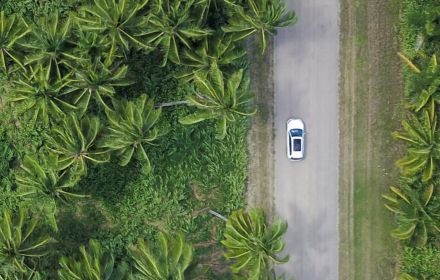The availability of fresh water is under increasing pressure in Belgium. "Human beings have adapted the landscape to their own needs for decades and we are now bearing the consequences," explain Kobe Geryl and Thomas De Ruyck, Physical Asset Manager and Director at KPMG. "In order to mitigate the risks, we need to significantly bet on data analytics. Because with the right data, we can assess the current situation, better predict the future and offer the right solutions."
Thomas: "In Belgium we often think it rains all the time, but actually, we live in a water-scarce region. On average, there are still as many cubic meters of rainfall as a hundred years ago, but it falls more erratically: less often and more intensely. As a result, periods of relative dryness alternate with periods of extreme rainfall, as we have unfortunately experienced in Belgium in recent years. Because of this extreme rainfall in a short period of time, the water simply does not get the chance to seep into the soil. Consequently, groundwater levels are dropping, even though on average the same amount of water is falling as before."
From water scarcity to conflict
Kobe: "In Flanders, the situation is even more precarious because we are so densely populated and built-up. Moreover, we don't have extremely large watercourses and, in recent decades, we have optimized our water systems to drain away water quickly and efficiently. This also explains the difference between 'drought' and 'water scarcity': there is no structural drought in Belgium as there is sufficient rainfall, but there is water scarcity as we drain this water instead of capturing it. It is high time to evolve towards circular water use, where we reuse water as much as possible."
Thomas: "Of course, water scarcity is not only an issue in Belgium. It is a global problem that manifests itself in different ways. I can imagine that within decades there will be water wars, with different regions fighting over potable water. Or that more and more people will migrate from drought areas to better, wetter places."
Kobe: "You can already see these conflicts now. For example, Ethiopia recently built the Great Renaissance Dam to generate electricity. But Egypt and Sudan disagreed with those plans because the dam would endanger their water supply. The United States and the African Union had to intervene to calm tempers."
Everyone needs to do their part
Thomas: "To mitigate the risks, both companies and citizens need to step up a gear. And politicians need to lay out a clear framework and provide incentives. For example, policymakers can consider allowing externalities or external costs of products to be offset, so that products that consume a lot of water are more expensive. At the same time, politicians must be careful that the price increase does not cause discrimination. Everyone must be able to participate, including those who are financially challenged."
Kobe: "These external costs require a complex calculation. Because the value of water is time and location specific and depends on the quality of the water. If it has rained a lot recently and the water level is high, water can be extracted without any problem. But when the water level is low, water abstraction can have adverse effects. The possible consequences depend on the local context, the vulnerability of nature, the needs of other consumers, and so on. The Vlaamse Milieumaatschappij (VMM) developed the Reactive Assessment Framework for Water Scarcity which maps economic, social and ecological costs and benefits of possible actions. KPMG is one of the parties to facilitate this framework in cooperation with all relevant stakeholders in Flanders.”
Towards a more data-driven policy
Thomas: "It is essential that we make the calculation, because it will help to determine the right interventions. Data analysis plays a key role in this. We don't just need to measure how much water we need and consume. We also need a more accurate picture of water quality. For example: drinking water distribution companies test drinking water pipes via sensors in real time for the presence of certain chemicals. By analyzing that data, they can reduce the flushing time of the pipes, resulting in less drinking water being lost."
Kobe: "There’s a lot of movement in this area. For example, Aquafin is experimenting with IoT sensors to centrally control rainwater wells. So, when a big downpour occurs, Aquafin can decide, with the owners' permission, to drain the well so that it doesn't overflow during the downpour. Such data-driven systems already exist in principle, but the central coordination makes it more efficient and user-friendly."
Thomas: "Local governments are also taking responsibility. As an inhabitant of Lier, you can no longer pave your front yard. In fact, some citizens are even required to depave their gardens. Governments must group such initiatives and share knowledge, so that they can learn from each other. Such data-driven policies are crucial for making the right decisions."
Blue and green economy
Thomas: "The switch will only be successful if citizens and companies also jump on board. Fortunately, we are already seeing good initiatives from these stakeholders. For example, Colruyt is investing in aqua farms in the North Sea, where the company eventually wants to grow its own oysters. And urban farming is also gaining in popularity. Food is being harvested and grown in containers or alongside blocks of flats, for example. You need less surface area, fewer ingredients and less water. And you also save on transport. Win-win, in other words."
Kobe: "Companies will have to include water management in their policies. Alternative water sources are increasingly being used, for example by using effluent, rainwater or surface water. They will also have to incorporate new technologies to purify and reuse used water. Companies can, and should, also work together on this. In Kruishoutem, for example, there is a tomato farm that shares residual heat from its greenhouses with its neighbor, a fish farm. In return, the tomato grower receives the nutrient-rich waste water from the fish farm to fertilize their plants. A unique collaboration, in which both parties together make optimal use of water and energy."
Thomas: "The examples cited also illustrate that the transition to a 'blue' economy plays an important role in the transition to a 'green' economy, in which the reuse of materials and the reduction of greenhouse gases are central."
A long process
Thomas: "With the Blue Deal, the Flemish government is taking a serious step in the right direction. KPMG, together with our partners Sumaqua and Common Ground, is proud to be involved in this key project. Concretely, we will support the Coordination Committee on Integrated Water Policy (CIW) in determining priorities for the distribution of subsidies. In addition, we will unlock important data for the various governments so that they can learn from it. Common Ground will be responsible for the overall branding of the project, while Sumaqua will use their know-how to scientifically underpin the Blue Deal projects by monitoring their impact. In the event of a natural disaster, the drought topic is always at the top of the political agenda. We want to make sure it stays there, even at times when it seems less precarious."
Kobe: "The Blue Deal is a long-term project. But, let’s not forget that the problem of water scarcity will only become more and more visible. Natural crises follow each other faster, as we have unfortunately experienced in Belgium (and across the globe) with the recent floods, which only increases the importance of water-saving initiatives. KPMG can assist governments and companies in this regard. We share our knowledge and expertise and explore how you can make a big impact.”
Starting your sustainability journey
With KPMG Sustainable Infrastructure and KPMG Smart Cities, we support companies and local governments to digitally collect data and use water and energy more efficiently and economically. Would you like more information about these services? Our experts would be happy to help you.
Connect with us
- Find office locations kpmg.findOfficeLocations
- kpmg.emailUs
- Social media @ KPMG kpmg.socialMedia






